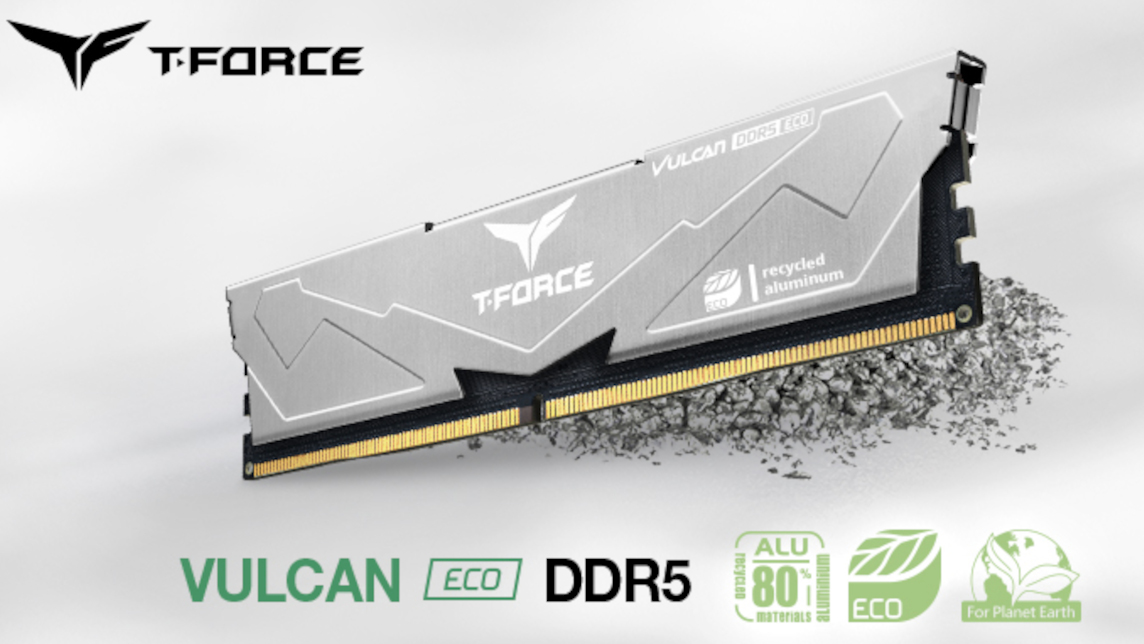TeamGroup debuts eco-friendly DDR5 RAM modules with heatsinks made from recycled aluminum, planet-friendly packaging
TeamGroup's T-Force Vulcan Eco DDR5 RAM uses a recycled aluminum heat spreader to reduce its ecological impact.

As DDR5 RAM continues rolling out alongside modern platforms, TeamGroup has launched a line of Eco-friendly DDR5 RAM with the goal of reducing the carbon footprint compared to traditional RAM manufacturing.
According to TeamGroup's press release, every 10 thousand recycled aluminum heatsinks made equates to a 73% reduction in carbon emissions. They're also using Forest Stewardship Council-certified packaging, which should mean the packaging is more sustainably-sourced than it would be otherwise.

Performance-wise, the T-Force Vulcan Eco DDR5 RAM is slated to provide throughput at up to 6,000 MT/s with support for both AMD EXPO and Intel XMP 3.0 memory overclocking profiles. It even features on-die Error Checking Code (ECC), which should further improve reliability and stability for use in professional environments.
The CAS Latency on offer will vary depending on whether you get a DDR5-6000 kit or a DDR5-5600 kit. The latter kit has the highest latency at a rating of CL40, while there are two DDR5-6000 kits at CL38 and CL30 (but with the DDR-6000 CL30 kit having the highest voltage). All T-Force Vulcan Eco kits start at 32 GB with two 16 GB modules for Dual-Channel operation, as well.
On paper, these numbers should put the T-Force Vulcan Eco DDR5 kits on par with other high-end DDR5 RAM kits on offer, though of course we'll have to wait and see some benchmarks before we can confirm that this RAM lives up to expectations. That said, TeamGroup RAM is originally sourced from Micron (like Crucial RAM is), and they've maintained a generally-positive reception over the years.
Even if the Vulcan Eco series lives up to expectations, though, one shouldn't expect it to compete with the most extreme DDR5 offerings on the market, like Corsair's DDR5-8000 RAM. Realistically, though, I think this Vulcan Eco offering has its place in the market— particularly for those who want to reduce their environmental impact, even in small ways.
Get Tom's Hardware's best news and in-depth reviews, straight to your inbox.

Christopher Harper has been a successful freelance tech writer specializing in PC hardware and gaming since 2015, and ghostwrote for various B2B clients in High School before that. Outside of work, Christopher is best known to friends and rivals as an active competitive player in various eSports (particularly fighting games and arena shooters) and a purveyor of music ranging from Jimi Hendrix to Killer Mike to the Sonic Adventure 2 soundtrack.
-
edzieba Here's an even more eco-friendly option: remove the cosmetic heatsinks entirely.Reply
No performance difference, saves the impact of Aluminium recycling, saves on shipping cost (lower weight), reduces packaging volume (not just because the sticks are thinner, but lower mass means less padding needed), etc.